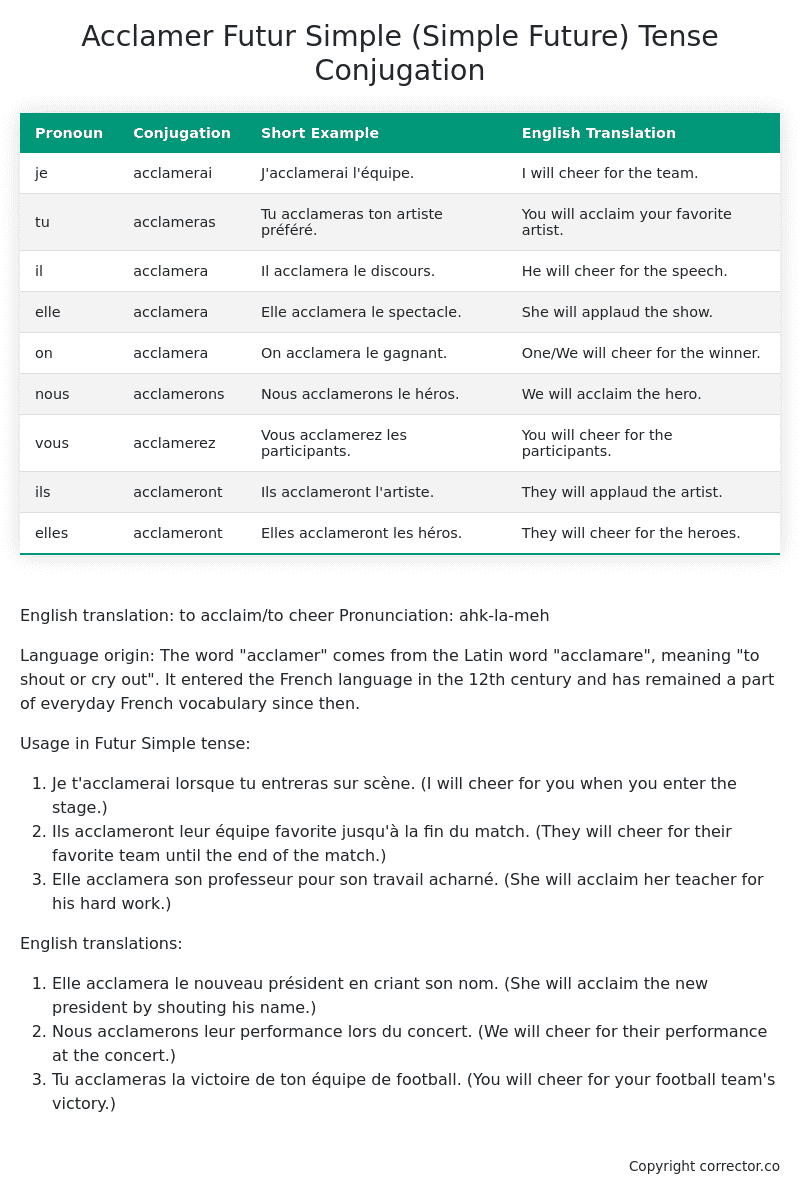Futur Simple (Simple Future) Tense Conjugation of the French Verb acclamer
Introduction to the verb acclamer
English translation: to acclaim/to cheer
Pronunciation: ahk-la-meh
Language origin:
The word “acclamer” comes from the Latin word “acclamare”, meaning “to shout or cry out”. It entered the French language in the 12th century and has remained a part of everyday French vocabulary since then.
Usage in Futur Simple tense:
- Je t’acclamerai lorsque tu entreras sur scène.
(I will cheer for you when you enter the stage.) - Ils acclameront leur équipe favorite jusqu’à la fin du match.
(They will cheer for their favorite team until the end of the match.) - Elle acclamera son professeur pour son travail acharné.
(She will acclaim her teacher for his hard work.)
English translations:
- Elle acclamera le nouveau président en criant son nom.
(She will acclaim the new president by shouting his name.) - Nous acclamerons leur performance lors du concert.
(We will cheer for their performance at the concert.) - Tu acclameras la victoire de ton équipe de football.
(You will cheer for your football team’s victory.)
Table of the Futur Simple (Simple Future) Tense Conjugation of acclamer
| Pronoun | Conjugation | Short Example | English Translation |
|---|---|---|---|
| je | acclamerai | J’acclamerai l’équipe. | I will cheer for the team. |
| tu | acclameras | Tu acclameras ton artiste préféré. | You will acclaim your favorite artist. |
| il | acclamera | Il acclamera le discours. | He will cheer for the speech. |
| elle | acclamera | Elle acclamera le spectacle. | She will applaud the show. |
| on | acclamera | On acclamera le gagnant. | One/We will cheer for the winner. |
| nous | acclamerons | Nous acclamerons le héros. | We will acclaim the hero. |
| vous | acclamerez | Vous acclamerez les participants. | You will cheer for the participants. |
| ils | acclameront | Ils acclameront l’artiste. | They will applaud the artist. |
| elles | acclameront | Elles acclameront les héros. | They will cheer for the heroes. |
Other Conjugations for Acclamer.
Le Present (Present Tense) Conjugation of the French Verb acclamer
Imparfait (Imperfect) Tense Conjugation of the French Verb acclamer
Passé Simple (Simple Past) Tense Conjugation of the French Verb acclamer
Passé Composé (Present Perfect) Tense Conjugation of the French Verb acclamer
Futur Simple (Simple Future) Tense Conjugation of the French Verb acclamer (this article)
Futur Proche (Near Future) Tense Conjugation of the French Verb acclamer
Plus-que-parfait (Pluperfect) Tense Conjugation of the French Verb acclamer
Passé Antérieur (Past Anterior) Tense Conjugation of the French Verb acclamer
Futur Antérieur (Future Anterior) Tense Conjugation of the French Verb acclamer
Subjonctif Présent (Subjunctive Present) Tense Conjugation of the French Verb acclamer
Subjonctif Passé (Subjunctive Past) Tense Conjugation of the French Verb acclamer
Subjonctif Imparfait (Subjunctive Imperfect) Tense Conjugation of the French Verb acclamer
Subjonctif Plus-que-parfait (Subjunctive Pluperfect) Tense Conjugation of the French Verb acclamer
Conditionnel Présent (Conditional Present) Tense Conjugation of the French Verb acclamer
Conditionnel Passé (Conditional Past) Tense Conjugation of the French Verb acclamer
L’impératif Présent (Imperative Present) Tense Conjugation of the French Verb acclamer
L’infinitif Présent (Infinitive Present) Tense Conjugation of the French Verb acclamer
Struggling with French verbs or the language in general? Why not use our free French Grammar Checker – no registration required!
Get a FREE Download Study Sheet of this Conjugation 🔥
Simply right click the image below, click “save image” and get your free reference for the acclamer Futur Simple tense conjugation!

Acclamer – About the French Futur Simple (Simple Future) Tense
Formation of Futur Simple
For regular -er verbs (e.g., parler – to speak)
For regular -ir verbs (e.g., finir – to finish)
For regular -re verbs (e.g., vendre – to sell)
Common Everyday Usage Patterns
Conditional Statements
Interactions with Other Tenses
Futur Antérieur
Conditional
Present
Summary
I hope you enjoyed this article on the verb acclamer. Still in a learning mood? Check out another TOTALLY random French verb conjugation!


